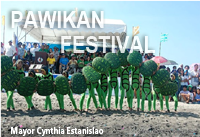
Cagayan de Oro is slowly becoming a popular adventure spot in Northern Mindanao with all its possibilities for outdoor activities. From zorbing to ziplining to whitewater rafting; there’s certainly something you can do in the city to get your adrenaline pumping. Of course, another exhilarating thing to do in the city is to visit some of its most famous naturally formed sites.

One of the country’s biggest, and most colorful harvest festival every May 15th, along with the harvest festivals of the towns of Tayabas, Sariaya, Gumaca and Tiaong. These are the Philippines best known harvest festivals to honor San Isidro Labrador, the patron saint of farmers. Known as the “Pahiyas”, the festival is deeply rooted in the traditional celebration of the townsfolk in thanksgiving for bounty harvest. Decorations called “Kiping”, leaf-shaped and multi-colored rice paste wafers which are used to decorate the facades of the homes along with fruits and flowers from nature.

Majestic Mt. Pulag is highest peak in Luzon and one of the most beautiful mountains in the Philippines. Its fabled views, of winding slopes of dwarf bamboo, and distant peaks surging like islets in the ocean of lofty clouds, comprise perhaps the most breathtaking sights in Philippine mountaineering. The native tribes say that Mt. Pulag is the "playground of the gods". In Luzon,
it is literally the closest to heaven that mountaineers can get!

The Pawikan Festival is an annual festivity for the province of Bataan. Conceptualize in the year 1999 to promote the conservation center and how to educate the locals and the whole nation. Then the The Pawikan Festival was born. Started on 2001, now after 9 years the people of Bataan is proud to say that they are the new defender of the environment.

General Information
Agusan March Wildlife Sanctuary was established by the virtue of Presidential.Proclamation No. 913 on October 31, 1996. It has been designated as one of the Ramsar sites in the Philippines and included in the list of Wetlands of International Importance (RAMSAR TREATY) No. 1009 dated November 12, 1999, being the refuge and nesting area of migratory bird species.


